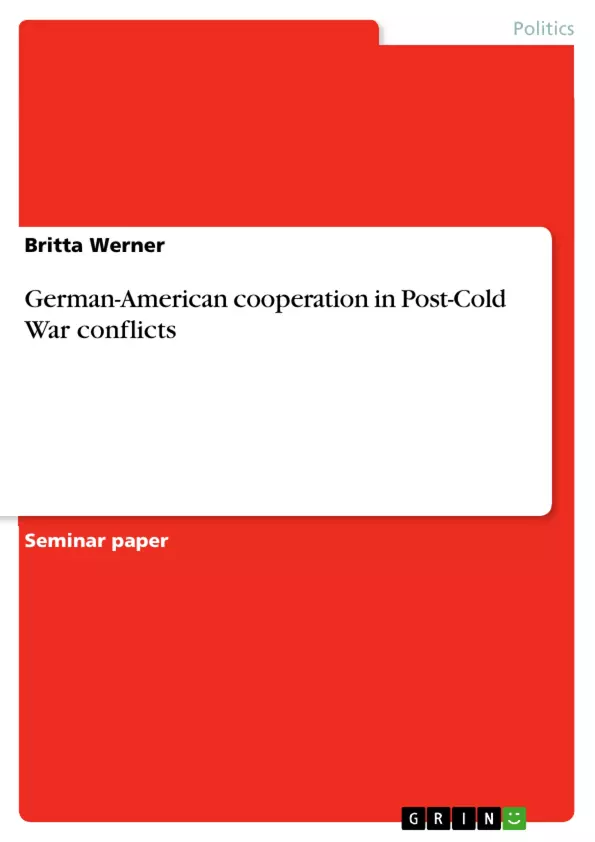What happened to German-American relations after the Cold War ended? Or more specifically, where and why did the Germans and Americans cooperate and follow common goals, where and why didn’t they? The Germans used to have a very positive attitude towards America. It represented strength, liberty, equality, prosperity and security which people in Germany and certainly many other countries admired.
But suddenly the named values weren’t received as good and useful qualities anymore. In contrary, America’s demonstrations of power suddenly conveyed the apparent wish to rule the world, the desire to appear superior and to monopolize control.
Germany shows a rather peaceful and mediating approach to international conflicts. This is partly due to historical experience, esp. during the last 50 years when old enmities to other countries, like France for instance, could successfully be buried by negotiating and signing various contracts which eventually tied them together in trade, defense, security and other matters.
This attitude though is clearly opposed to America’s mostly military strategy (and nowadays Bush’s sort of “attack is the best defence” principle) which again could be explained with positive historical experience since from the American point of view the Cold War was won mainly by military strengh and persistence.
These basic conditions must be considered when trying to give reasons for cooperation or dissociation between Germany and America after the Cold War.
Inhaltsverzeichnis (Table of Contents)
- Preface
- German-American cooperation in post-Cold War conflicts
- Literature
Zielsetzung und Themenschwerpunkte (Objectives and Key Themes)
This essay aims to analyze the cooperation between Germany and the United States in post-Cold War conflicts, specifically focusing on the wars in Kosovo and Afghanistan. The essay seeks to understand the reasons behind their joint efforts and the challenges that arose in their partnership.
- Shifting dynamics in German-American relations after the Cold War
- Contrasting approaches to international conflicts: Germany's peaceful mediation vs. America's military strategy
- The role of historical experiences and perceptions in shaping bilateral relations
- The impact of the Kosovo and Afghanistan wars on German-American cooperation
- The emergence of tensions and disagreements leading up to the Iraq War
Zusammenfassung der Kapitel (Chapter Summaries)
- Preface: This section explores the changing dynamics of German-American relations after the Cold War, highlighting the shifts in perceptions of American power and the contrasting approaches to international conflict resolution.
- German-American cooperation in post-Cold War conflicts: The chapter focuses on the collaboration between Germany and the United States in the Kosovo and Afghanistan wars. It examines the background of these conflicts, the reasons for German participation, and the challenges faced in coordinating actions.
Schlüsselwörter (Keywords)
The primary keywords and focus topics include German-American relations, post-Cold War conflicts, Kosovo War, Afghanistan War, international terrorism, military intervention, peaceful mediation, historical experiences, perceptions of power, and contrasting approaches to conflict resolution.
Frequently Asked Questions
How did German-American relations change after the Cold War?
The relationship shifted from a dynamic of clear security dependence to one where perceptions of power and conflict resolution strategies often diverged.
What are the main differences in conflict resolution between the two countries?
Germany tends to favor peaceful mediation and multilateral contracts, while the U.S. often relies more on military strategy and intervention.
Which specific conflicts are analyzed in this essay?
The essay focuses on cooperation and challenges during the wars in Kosovo and Afghanistan.
Why did Germany participate in the Kosovo and Afghanistan wars?
Participation was driven by international obligations, the fight against terrorism, and a shift in Germany's role in global security.
What led to the tensions regarding the Iraq War?
Tensions emerged due to fundamental disagreements over the necessity of military intervention and unilateral versus multilateral approaches.
- Citation du texte
- M.A. Britta Werner (Auteur), 2006, German-American cooperation in Post-Cold War conflicts, Munich, GRIN Verlag, https://www.grin.com/document/155239



